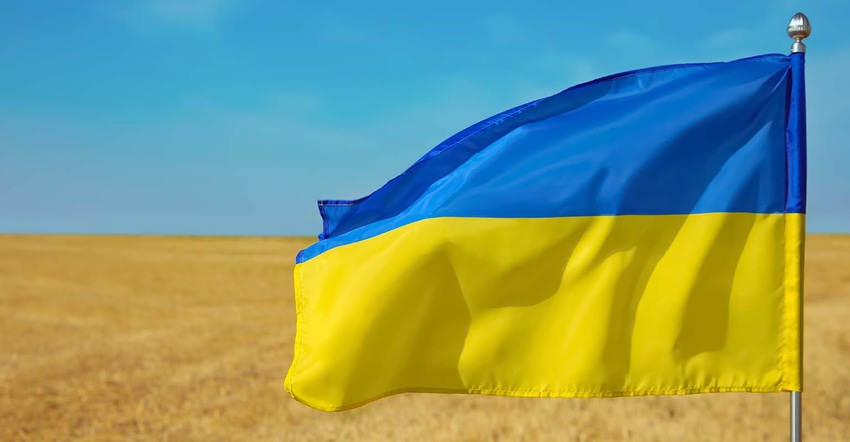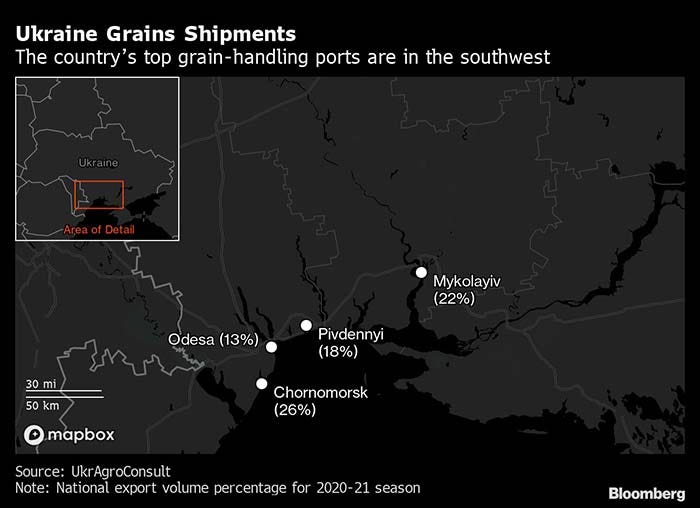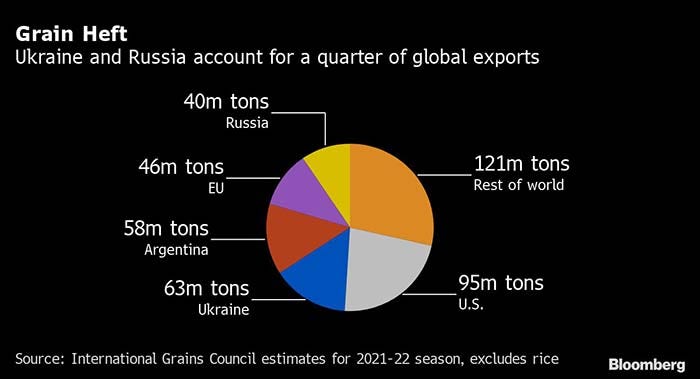
By Alberto Nardelli with assistance from Daryna Krasnolutska
Senior European officials see little chance Russia is willing to ease global food pressures by striking a deal to let Ukraine resume crucial grain exports, saying the Kremlin views the crisis as leverage against Kyiv and its allies.
Government and intelligence officials say United Nations-facilitated negotiations with Moscow and Kyiv are still struggling to make progress. They asked not to be identified discussing such sensitive matters. Many issues are unsolved, one person familiar with the discussions said, including how goods can move safety within and from Ukraine.
One of the people said the Kremlin had manufactured the debate as a means to get sanctions lifted and was intent on using the threat of global hunger as a bargaining tool in any future peace talks. The U.S. has not sanctioned any Russian agricultural products in response to the war and says there is no link between the penalties on Moscow and grain or fertilizer exports from either Russia or Ukraine.
Russian President Vladimir Putin’s invasion has caused untold human and economic destruction in Ukraine and forced millions of people to flee internally or into Europe. It has also triggered what many policy-makers warn could be a spiraling food crisis around the world by cutting off shipments of Ukrainian agricultural commodities, at a time prices are already rising and shortages are being felt as far afield as North Africa and Asia.
With Ukraine’s Black Sea ports scattered with mines and Russia effectively blocking shipping in the area, countries from Turkey to the U.S. have been grappling for a solution to get Ukrainian grain moving again. More than 25 million tons of grain, sunflower oil and other commodities are estimated to be stuck. The government in Kyiv has also accused Moscow of stealing its grain stores and moving them into Russia, and of targeting storage facilities with missile strikes. Russia denies using food as a weapon.
There remains the hope that Ukrainian and Russian ministers could meet for discussions in the Turkish city of Istanbul this week, according to a person familiar with the conversations. The UN-facilitated talks would aim to reach the outline of an agreement this month to move 2 million metric tons of grain a month from July, the person said.
Russian Foreign Minister Sergei Lavrov met his Turkish counterpart Mevlut Cavusoglu in Ankara last week. The discussions, to which Ukraine said it was not invited, yielded no progress.
Either way, Ukraine is unlikely to agree to a request by Moscow to remove mines from ports placed to defend them from possible attacks by Russian forces. Kyiv has said it’s not convinced by Moscow’s assurances it won’t strike, noting that Russia also insisted before the war it had no plans to invade.
The crisis has set off a race for contingencies to get grain out of Ukraine from alternative routes across Europe before the arrival of the next harvest. President Volodymyr Zelenskiy has said the amount of grain waiting to be shipped out of Ukraine may reach 75 million tons in the autumn after that harvest.

De-mining would take months to complete even if it was agreed to. Grain could instead move out of three ports in the Black Sea through “safe lanes” in Ukrainian territorial waters to the Bosporus, one of the people said. It’s unclear how that would avoid the need to remove mines from ports for ships to dock and pick up grain before sailing through those marked lanes. Cavusoglu said Wednesday there is no need to clear all mines to establish the corridor.
There is a separate discussion among the EU and other nations around the use of harbors in Poland and Romania and the possibility of rail transport links to ports further afield in the Netherlands, Germany and the Adriatic, the person said. President Joe Biden said on Tuesday the U.S. was working to build temporary silos in Poland and other places along the Ukrainian border and then send grain out on trains.
Overland routes are likely to be much slower and face their own logistical challenges including overloaded railway networks, backlogged ports in eastern Europe and differing railway gauges into Europe. Even if those issues are all solved, it wouldn’t fully replace exports from ports in the Black Sea, the person said.
One official said the biggest issue of all was a lack of trust in Russia. Putin has directly tied the unclogging of Ukrainian grain shipments to getting sanctions lifted on Russia, and his officials continue to perpetuate the claim that food shortages are the result of those sanctions.

A senior European intelligence officer said Moscow was spreading a similar message through influence and disinformation operations in the Middle East and Africa.
U.S. and European sanctions do not target Russia’s agricultural sector nor the transportation of food supplies and agricultural goods. The EU’s restrictions do not impede Moscow from exporting its fertilizers to third countries. That’s even as some shippers, banks and insurers are shying away from trade in Russian fertilizer, with the U.S. government now quietly encouraging companies to buy and carry more of it.
Any deal to ship by sea will need to come with assurances that Russia won’t target Ukraine’s storage facilities, as well as its transport and export infrastructure, one person said.
The two sides also need to agree to inspections, with UN-flagged inspectors seen as a possibility. Russia has said it wants to control any such checks, according to the person.
Other operational challenges include the need to procure large ships, how to move grain safely from various parts of Ukraine to ports and how to insure cargo.
Officials are equally pessimistic about the chances of an agreement that would see Ukrainian grain moved out via neighboring Belarus, a country that has been used by Russia as a staging point to get troops into Ukraine.
A senior intelligence officer said it was likely that Russia was coordinating with Belarus, which is eager to get its own sanctions dropped. Ukraine has already ruled out using Belarus as a conduit.
© 2022 Bloomberg L.P.
About the Author(s)
You May Also Like




